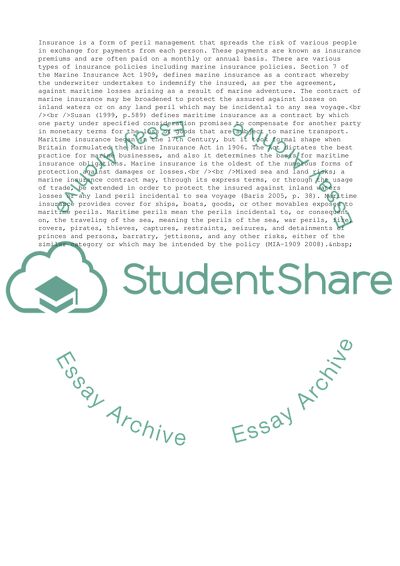Cite this document
(Inland Marine Insurance and Ocean Marine Insurance Coursework, n.d.)
Inland Marine Insurance and Ocean Marine Insurance Coursework. https://studentshare.org/business/1768051-the-main-function-of-marine-insurance-is-to-compensate-the-insured-for-loss-or-damage-caused-by-the-risk-insured-against-in-many-cases-the-compensation-by-the-insurers-takes-the-form-of-indemnity-what-do-you-understan
Inland Marine Insurance and Ocean Marine Insurance Coursework. https://studentshare.org/business/1768051-the-main-function-of-marine-insurance-is-to-compensate-the-insured-for-loss-or-damage-caused-by-the-risk-insured-against-in-many-cases-the-compensation-by-the-insurers-takes-the-form-of-indemnity-what-do-you-understan
(Inland Marine Insurance and Ocean Marine Insurance Coursework)
Inland Marine Insurance and Ocean Marine Insurance Coursework. https://studentshare.org/business/1768051-the-main-function-of-marine-insurance-is-to-compensate-the-insured-for-loss-or-damage-caused-by-the-risk-insured-against-in-many-cases-the-compensation-by-the-insurers-takes-the-form-of-indemnity-what-do-you-understan.
Inland Marine Insurance and Ocean Marine Insurance Coursework. https://studentshare.org/business/1768051-the-main-function-of-marine-insurance-is-to-compensate-the-insured-for-loss-or-damage-caused-by-the-risk-insured-against-in-many-cases-the-compensation-by-the-insurers-takes-the-form-of-indemnity-what-do-you-understan.
“Inland Marine Insurance and Ocean Marine Insurance Coursework”. https://studentshare.org/business/1768051-the-main-function-of-marine-insurance-is-to-compensate-the-insured-for-loss-or-damage-caused-by-the-risk-insured-against-in-many-cases-the-compensation-by-the-insurers-takes-the-form-of-indemnity-what-do-you-understan.


